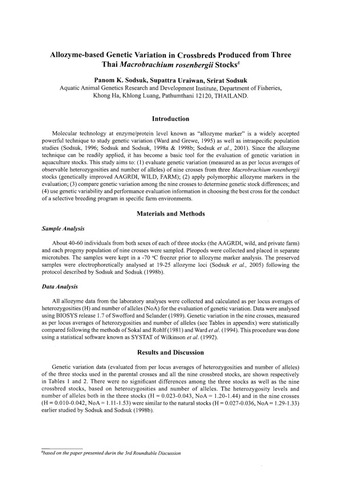Allozyme-based genetic variation in crossbreds produced from three Thai Macrobrachium rosenbergii stocks
- Global styles
- MLA
- Vancouver
- Elsevier - Harvard
- APA
- Help
Share
抄録
Molecular technology at enzyme/protein level known as “allozyme marker” is a widely accepted powerful technique to study genetic variation (Ward and Grewe, 1995) as well as intraspecific population studies (Sodsuk, 1996; Sodsuk and Sodsuk, 1998a & 1998b; Sodsuk et al., 2001). Since the allozyme technique can be readily applied, it has become a basic tool for the evaluation of genetic variation in aquaculture stocks. This study aims to: (1) evaluate genetic variation (measured as as per locus averages of observable heterozygosities and number of alleles) of nine crosses from three Macrobrachium rosenbergii stocks (genetically improved AAGRDI, WILD, FARM); (2) apply polymorphic allozyme markers in the evaluation; (3) compare genetic variation among the nine crosses to determine genetic stock differences; and (4) use genetic variability and performance evaluation information in choosing the best cross for the conduct of a selective breeding program in specific farm environments.
Suggested Citation
Sodsuk, P. K., Uraiwan, S., & Sodsuk, S. (2007). Allozyme-based genetic variation in crossbreds produced from three Thai Macrobrachium rosenbergii stocks. In M. R. R. Eguia & M. L. C. Aralar (Comps.), Recent developments in the genetic improvement of the giant freshwater prawn (Macrobrachium sp.) (pp. 48–51). Tigbauan, Iloilo, Philippines: Aquaculture Department, Southeast Asian Fisheries Development Center.
Type
Book chapterISBN
9789718511848



